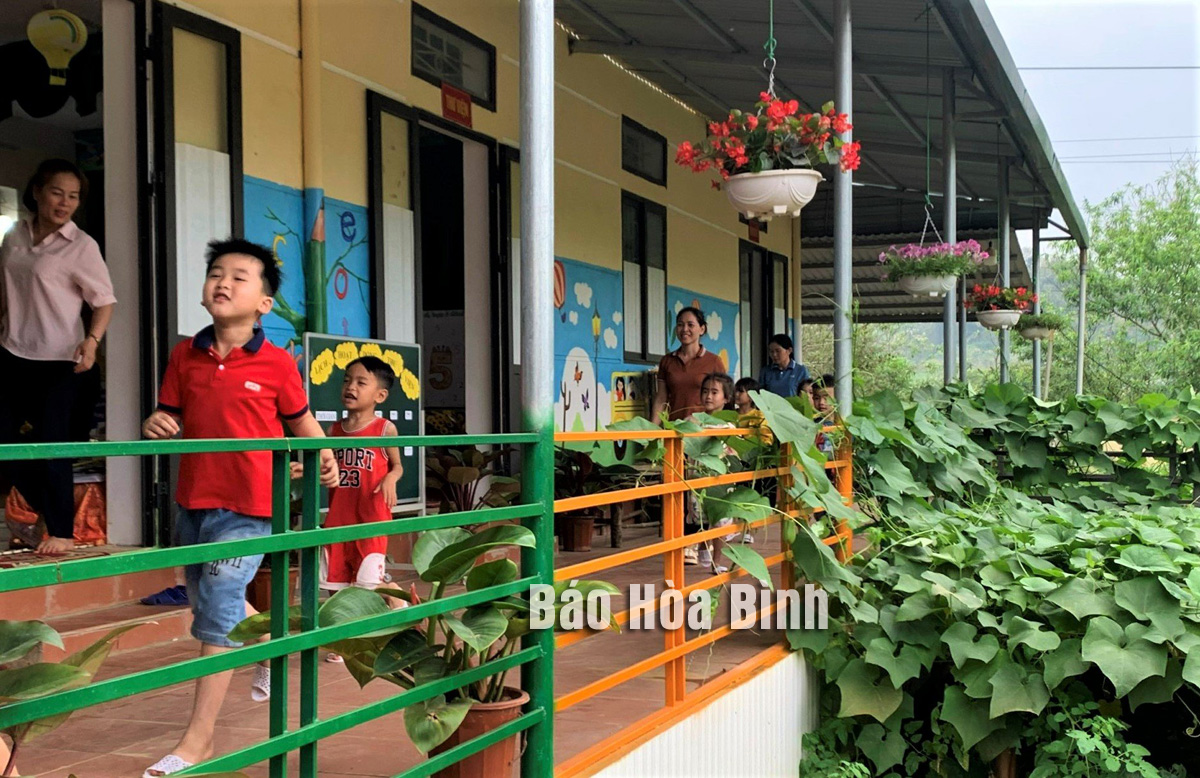
Hoa Binh’s education and training sector is implementing concerted measures to better the quality of education and training, proactively implementing the national target programme on new rural area building.
At Phu Vinh kindergarten in Phu Vinh
commune, Tan Lac district.
Education is one of the important criteria in the national target programme on
new rural area building. The provincial Department of Education and Training
has promptly issued documents directing and guiding the offices under its wing
in the locality to develop plans for implementing the programme in 2024.
So far, 80 out of the 129 communes in the province have met Criterion No.5 on
school, equivalent to 62% of the total. As many as 224 out of the 369
preschools, primary schools, and secondary schools met national standards.
For Criterion No. 14 on education and training, the sector has focused on
reviewing and supplementing the school development plan to meet national
standards, and strengthening the training and fostering of managers and
teachers to ensure sufficient quantity and quality.
Attention has been paid to promoting collaboration among departments, sectors,
organisations, social forces, parents and families of students, towards
building a healthy environment for managing, caring for and educating students;
and improving the quality of teaching and learning to increase the rate of
schools meeting national standards.
Statistics show that 128 out of the 129 communes in Hoa Binh met Criterion
No.14, equivalent to 99.2%. There were 128/129 communes fulfilling universal
preschool education for five-year-old children; 100% of the communes met the
standard of universal primary education at Level 2 or higher; all the 129
communes met the standard of theuniversalisation ofjuniorsecondary
schooleducation; and 99.2% of the communes completed illiteracy eradication standards at Level 2.
According to the provincial Department of Education and Training, the locality
aims to have 87 communes meeting Criteria No.5 on school; over 65% of the
preschools, primary schools, secondary schools and high schools having
facilities meeting national standards; and 128 communes meeting Criteria No.14
on education.
The communes registered for becoming new-style, advanced and model rural communes
are expected to meet the criteria on education.
More than just an information technology teacher, Bui Van Nien is an inspiring figure who has nurtured the scientific curiosity and creative spirit of students in Vietnam’s ethnic minority communities.
Da Bac is the most disadvantaged mountainous district in Hoa Binh province, with ethnic minorities accounting for about 90% of its population. Over the past years, the district has mobilised resources to implement ethnic policies to improve the quality of life of local people.
In recent years, Hoa Binh province has consistently prioritised the protection, care, and education of children, particularly those from ethnic minorities and disadvantaged backgrounds, by creating a safe, healthy, and nurturing environment for their all-round development.
The Steering Committee for Tobacco Harm Prevention and Control of Hoa Binh province, in coordination with the Tobacco Harm Prevention and Control Fund, held a ceremony on May 28 in response to the World No Tobacco Day (May 31) and the National No Tobacco Week (from May 25 to 31). The event was chaired by Nguyen Van Toan, Standing Vice Chairman of the provincial People’s Committee and head of the Steering Committee.
Since 2021, the Center for Industrial Promotion and Industrial Development Consulting (CIIDC) under the Department of Industry and Trade has been implementing a school lighting model as part of the plan for using energy efficiently and economically in Hoa Binh Province in the pẻiod of 2021 - 2025. This model not only aims to improve the learning conditions and enhance the education quality, but it also promotes the message of energy saving, energy security, environmental protection and contributes to the goals of socio-economic development.
In the 2024 - 2025 school year, the entire Hoa Binh provincial education sector includes 520 educational institutions and schools. Among them are 13 ethnic boarding schools with 153 classes and 4,487 students. Four of these schools have met national standards, reaching 30.7 percent.



